|
Choice Publishing Book Store |

|
St Francis Uncensored By Patrick Noonan
ISBN: 978-1-911131-05-2
Price: €10.99
|
|
This book is a tentative, daring exploration of St Francis as rarely seen before – his personality, a probe behind the domesticated image, a different window on his personal struggle for meaning. It is about how he discovered and managed what God was calling him to do and to be. This is about a Francis who lived in a pre-industrial era where life for the poor was short, cheap and brutally bloody. He lived in the time of action men like the mythical Robin Hood and his merry men. The author has lived, like most missionaries, in raw impoverished situations and so has some idea of the unpredictability and fragility of life; perhaps as a secondary witness all the way from the peripheries so often mentioned by the present Pope, and lived by Francis. This is the Francis depicted in this book; the man from the margins, the outsider from nowhere, the misfit who guides Popes.
Patrick Noonan has lived and worked in Europe, the Middle East and the black townships of South Africa since 1970 and was still there when his area – known as the Vaal Triangle – exploded in anti-apartheid rage in the latter half of 1984. It was the uprising that signalled the beginning of the end of apartheid and led to the release of Nelson Mandela. He has assisted the South African Council of Churches in the area of post-apartheid reconciliation. Noonan’s book They’re Burning the Churches (Jacana Media, 2003) which was read last year on South African radio is a contribution towards that goal. It is now in its third edition. The extremes of “crisis ministry” has spurred the author to write the present book and crucially to enable him to put others in touch with much of the actual day-to-day experiences Francis would have known after his conversion. He is a member of the international Franciscan movement and has written many articles for church magazines and newspapers.
BREAKING WITH HOME
With his new-born self-awareness, Francis was fast outgrowing his parents’ spirituality – a quiet but startling realisation in any person’s life. It was very disconcerting for all concerned, the aunts and uncles too. For his mother and father there was private grieving, and indeed loss, in their relations with their son. For Francis, it was surely a lonely, singular and sad breaking of ties with his beloved parents. He felt more on his own than ever before. Simultaneously, he felt strongly a need for new space, a new independence in his life. The lure of something beyond the family was becoming more insistent, more definite and demanding.
* * *
LIKE POPE FRANCIS, THE FIRST FRANCIS OF ASSISI OPERATES INTENTIONALLY OUTSIDE THE BOX
Why did Francis appear to go further, to minister beyond the boundaries and parameters of local institutions, municipalities, customs, parishes, churches and even dioceses, and yet retain the friendship and protection of the ecclesiastical authorities? How did he get away with it? He knowingly subverted the social and political conventions of his day by forbidding his lay followers to carry weapons. This at a time when it was normal for everyone to carry knives, cutlasses, daggers or swords to protect themselves from ever-present death squads, thugs and highway robbers. He was like that. Is like that. Like Pope Francis, you just don’t know what divine surprise is coming up next.
* * *
A MAN ON A JOURNEY TO GOD KNOWS WHERE
Not all the brothers were convinced about Francis’s being constantly on the move in the name of peace building. Some Franciscan dissenters, especially the more housebound, complained about his constant peace initiatives in faraway places. He was needed at home, they grumbled. But Francis ignored them; prompted and assured by God. Remember he had been through the mill, had seen the violence, had felt the pain and was in no mood to submit to spiritual blackmail or immature pettiness. Looking back, we now can see that Francis was evolving into a new spirituality within the formalised religion of the Church. A new spirituality within the community of the faithful.
Also by Author Patrick Noonan |
|
About the Book: |
|
About the Author: |
|
Sample Excerpts: |

|
THEY’RE BURNING THE CHURCHES BY PATRICK NOONAN
Were the churches of South Africa of the eighties in the black townships and the white cities really worlds apart? This extraordinary book is about how the community in the townships confronted the shuddering political and social changes of the time. It tells about the when, where, how, why and what happened that changed the body and soul of South Africa. |
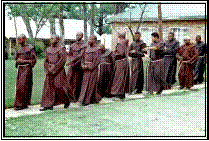
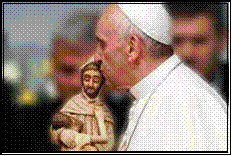
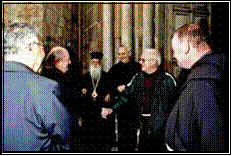
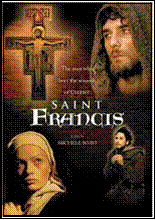
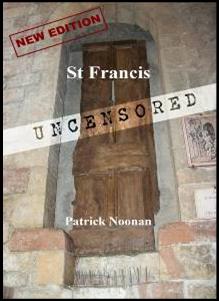
|
Finding St Francis in SA today by Gunther Simmermacher · October 4, 2016 ST FRANCIS UNCENSORED, by Patrick Noonan OFM. Choice Publishing, Ireland. 2016. 197pp Reviewed by Günther Simmermacher Seconds after Cardinal Jorge Bergoglio, the Jesuit archbishop of Buenos Aires, was elected pope in March 2013, his Brazilian confrere Cardinal Claudio Hummes whispered to him: “Don’t forget the poor.” At that moment Bergoglio decided to take the name Francis, after the great saint of Assisi and founder of the Franciscan order, of which the author of this book is a member. In St Francis Uncensored, Fr Noonan seeks to present the 13th century saint as a radical whose message and example still have application today. St Francis has versatile appeal. To some he is the proto-hippie who renounced materialism and preached to the birds. To others he was the adamantly faithful son of the Church, or the reformer, or the eco-warrior, or the ascetic mystic, or the apostle to the poor, or the peacemaker. Or a broth of all or some of these ingredients. For Fr Noonan, St Francis is all of these, but more. His Francis Bernardone was a subversive who repudiated a life of privilege to start a social revolution. The key event, richly symbolic, is when Francis disrobes in the busy square of Assisi, in front of the mayor, bishop and townsfolk, and throws his garments at his distraught father — the textile merchant (for whom Fr Noonan has great empathy) is rejected with his own cloth. Standing naked and vulnerable in the town square, like a newborn, Francis formalised his rebirth. Having broken so publicly with his family and life of privilege, he grabbed his freedom from the dictates of father and society. There was no turning back from that. The Francis that emerges from Fr Noonan’s pages derives his power not from his eventual popularity — he and his associate St Clare were celebrities in their own lifetimes — nor from having the ear of the pope, but from occupying the lowest echelon of power, right down to the vulnerability of going unarmed at a time when life truly was cheap and everybody was bearing weapons. Having nothing material to lose gave Francis power. In South Africa, Fr Noonan suggests, we would find St Francis on the frontlines of the deepest poverty.
St Francis and the bird, outside the basilica of St Mary of the Angels in Assisi. The author acknowledges the Francis who was devoted to the Eucharist, Our Lady, the cross, the Trinity, the sacraments, prayer, poverty and obedience. But, he argues, “the real Francis was more than his teachings”. To Francis, faith was not static but had to lead somewhere and “penetrate deeply into the broken body of Christ”. Many of Francis’ activities “were a direct reaction to Church and State arrogance, violence, corruption and evil”, Fr Noonan writes. “Today, at this moment, there are new types of arrogance, violence, corruption and evil in our world and in our Church that challenge the lovers of St Francis to imagine new options, to contemplate new solutions, and to explore new choices.” Fr Noonan also shines a light on St Francis the peacemaker, noting that his unconventional initiative in mediating with the Muslim rulers at Crusader-besieged Damietta would have found very little favour in Christendom. Yet the Damietta initiative showed a new kind of peacemaking, through negotiation, respect and giving courageous witness in situations of war. No doubt Pope Francis was thinking of Damietta when he took the courageous decision to travel to a place of civil war, the Central African Republic, in November 2015 — a visit which is now widely said to have been a decisive moment having brought (a hopefully lasting) peace to that country. St Francis Uncensored, a brief book that might have benefited from more ruthless editing, is not a biography of the saint; it requires some prior, at least cursory, knowledge of his life. Even today and even in South Africa, St Francis remains acutely relevant, as Fr Noonan persuasively shows. This is indeed an important book.
|
|
Book Review: |
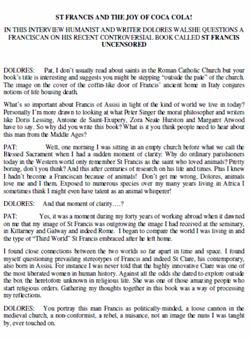
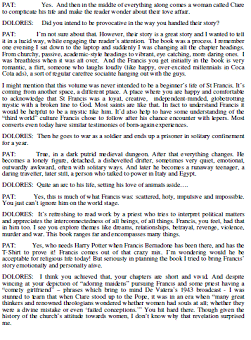
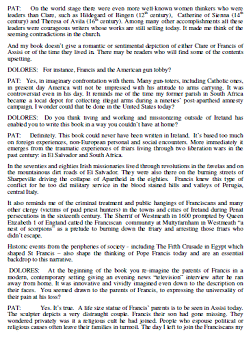
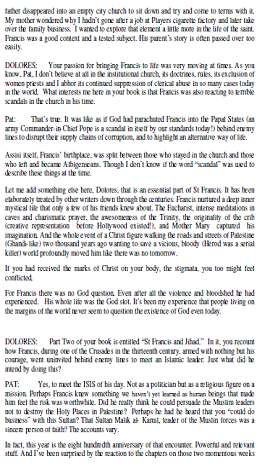
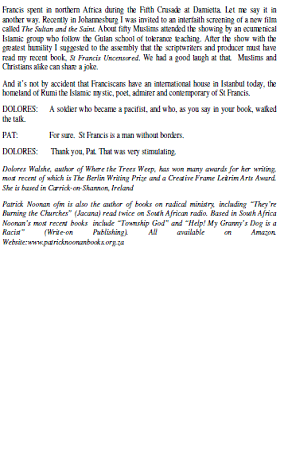
|
Interview with Humanist Dolores & Author Patrick Noonan |
